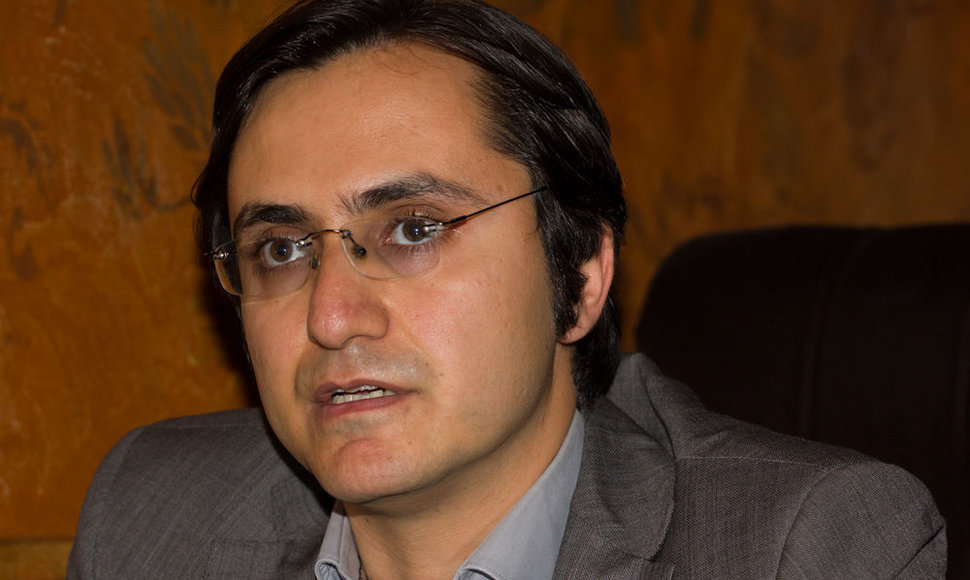Yet despite the many challenges, he is planning to stay in Lithuania. He says he can breathe freely here, while in Iran, people's liberties are severely suppressed.
– What made you leave Iran and come to Lithuania?
– I came here because of a complicated situation in my homeland. The international community has imposed sanctions on Iran because of its nuclear programme. That is a big burden if you want to take up business. There is a ban on making international money transfers. It is also forbidden to receive money from foreign clients.
I left Iran not because of money, but because of freedom you get in countries like Lithuania.
I have a metal business in Iran, but I cannot develop it because of the restrictions I've mentioned. So I decided to start something new in Europe. I left Iran not because of money, but because of freedom you get in countries like Lithuania. When you live here, it is hard to imagine what young people experience in Iran.
– Why did you choose this country?
– Lithuania is in the EU. The country has dealt well with the recession, the economy is growing. And that's what made me choose Lithuania. I'm starting a marketing, investment, and legal consulting business. I've already got partners in Lithuania and abroad.
– Iran usually makes international headlines because of its aggressive foreign policy and nuclear programme. In Europe, it is not seen as a friendly state. Do you feel this when you interact with people in Lithuania?
– I do realize how we are seen by the world. Especially because of the statements that our president makes about the Jews. I've studied Lithuania's history and I know that these are painful issues for you as well. Lithuania has experienced much warfare. I was also born during a war.
– What are your business plans for the nearest future?
– There are many wealthy people in Iran who would be happy to give their money to construction, real estate, logistics projects. They are now doing it in Dubai, Canada, Western Europe. We'll help them do the same in Lithuania.
One must understand that, unlike other foreigners, we cannot live in Iran and go international with our businesses from there. Various bans prevent that. In order to invest abroad, Iranians are forced to leave their country.
When they do business in foreign countries, their financial ties to Iran are constantly under surveillance, therefore many start companies in other countries in order to manage their businesses in all the world.
– Did coming to Lithuania involve a lot of paperwork?
In order to invest abroad, Iranians are forced to leave their country.
– Physically leaving the country is not difficult. I simply used services of a travel agency. However, there are no direct flights to Lithuania. Nor is there a Lithuanian embassy in Iran. I dealt with visa issues in the Hungarian embassy. My wife has stayed in Iran, but I hope she'll be able to join me in Lithuania within several years.
– How easy is it for an Iranian national to start a business in an EU member state?
– In Europe, they look suspiciously at people from Iran. They scrutinize their connections. If you're receiving money transfers in a bank, you must present all relevant documentation. I cannot blame them for it. Iran is under international sanctions. But they should also understand that Iranian entrepreneurs who work abroad will never risk getting blacklisted for cooperation with special services or other state institutions. That would mean the end of their businesses. Iranian businesspeople who work abroad have no ties to the authorities, otherwise their businesses would get closed down.
– How long have you been in Lithuania?
– I established a company last summer. But I had to wait six months until my residency application was processed. In order to get the permit, I had to give a long-term address, so I had to rent a flat for half a year and keep it empty – I was living in Iran in the meantime.
I had difficulty finding a landlord who'd rent me a flat and allow me to declare it my permanent address. When I'd meet and tell them where I was from, people would shut their doors or find excuses to turn me down. But all issues were gradually settled. I received a residency permit in February. Iran was celebrating the New Year at the time.
Iranian entrepreneurs who work abroad will never risk getting blacklisted for cooperation with special services or other state institutions.
– You must have felt sharp cultural, religious, political difference between the two countries?
– People do not realize the scale of difficulty that young people face in Iran. I am thirty. Like many others, I wanted to leave for a country where I could breathe freely. It was much more important for me than making money. I know that building a business will take time, but in Lithuania, I can have free access to information, get experience, grow.
In Iran, every website is filtered. 15min.lt is also blocked. Why? I phoned my internet service provider and asked why I could not access Lithuanian business sites. I received no answer.
If you want to watch foreign TV programmes in Iran, you must have a satellite dish. But any police officer can climb on your roof and throw it down. You are not allowed to watch foreign news broadcasts or entertainment channels. These are simply things that start getting to you.
If my business failed and I had no money to stay in Lithuania, I'd fly to Iran, I'd work, save money, and return here. When you cannot breathe freely in your own country, you go look for another one.
– Many Lithuanians probably do realize how much freedom they've got. We have just recently shaken off a totalitarian regime ourselves.
– I do not want to paint things in black and white. There are issues with democracy in Lithuania as well. Vilnius municipality was just engaging in a legal battle about a venue for a gay march. But the problem is just the location, not the march itself. In Iran, such an event would be inconceivable.
– You live alone in Lithuania. Do you spend all your time working?
– I have some spare time, so I go and see architectural monuments of Vilnius. They are very beautiful. In Iran, we have historic monuments that are two or three thousand years old, but very few tourists can see them. Many are simply not allowed to enter the country.
At the moment, I am teaching myself Lithuanian and I'm hoping to stay here. So far, I haven't met a single Iranian living in Lithuania, but I think there must be some. I want to build a network of business and personal contacts, but that takes time.
– If your business goes well, perhaps more entrepreneurs will come from Iran?
– I've already got my first business clients, but getting a foothold in Lithuania is not easy. Very recently, a bank closed my account, because I received a transfer from a Dubai-based company owned by Iranian shareholders. They do not live in Iran any more, but Lithuania takes sanctions against this country very seriously, without giving too much thought whether a particular person has any connection to the Iranian government. Thus we find ourselves in a vicious circle we cannot escape. Our freedoms remain constricted even after we leave Iran. I believe the situation will change, once the international community and Iran come to an understanding. I hope this will happen soon.













